Couple Quits City-Life, Helps 10000 Rural Women Understand Sexual & Reproductive Rights
Dr Manisha Gupte and Dr Ramesh Awasthi run MASUM (Mahila Sarvangeen Utkarsh Mandal), a collective of thousands of women across Maharashtra who mobilise to gain a better understanding of their sexuality, and what rights they have over their bodies.
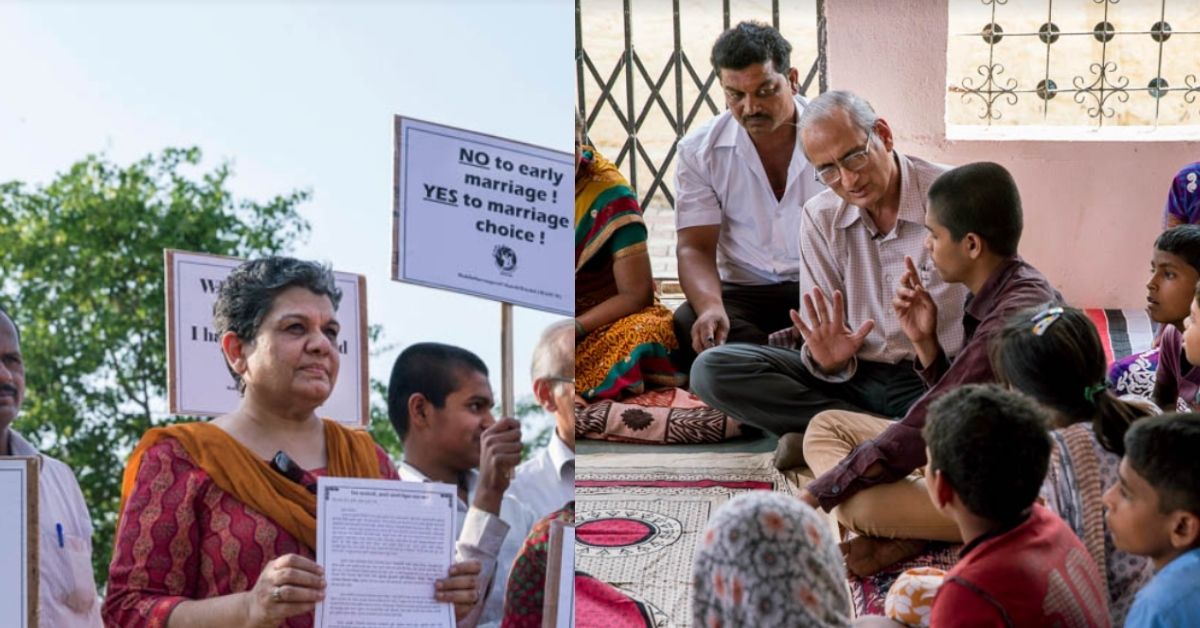
A caravan of shepherds passes through a village. Suddenly, they pause, and a woman hops off her mule, while two others stand around her. They hold up two ends of a saree to shield her from the view of passersby.
A few minutes pass. Slowly, the saree is lowered. The woman has delivered a baby on the side of the road.
Her friends wash the infant gently, and moments later, the shepherds are on their way again. It’s almost as though nothing happened, except that they now embark upon their journey with a newborn in tow.
In the five years that Dr Manisha Gupte and Dr Ramesh Awasthi spent in Malshiras village in Maharashtra, they came across such many alarming instances. “One time, I was driving a woman in labour to the nearest hospital. The road was so uneven and kaccha that her contractions began in the middle of our journey. We delivered her baby on the corner of the road,” Dr Gupte recalls in a conversation with The Better India.
In rural India, the gender divide poses a great hindrance to access to healthcare, where women have little to no agency over their bodies. Moreover, gaps exist in removing myths and superstitions, breaking down caste and class barriers, and so much more.
In the last 35 years, Dr Gupte and Dr Awasthi have attempted to bridge these gaps with their organisation MASUM (Mahila Sarvangeen Utkarsh Mandal), a collective of thousands of village women across Maharashtra. The NGO aims to encourage community participation and action through several programmes, which include women’s right to emotional and physical health, a life free of violence and discrimination, political participation, economic empowerment, and youth and child rights.
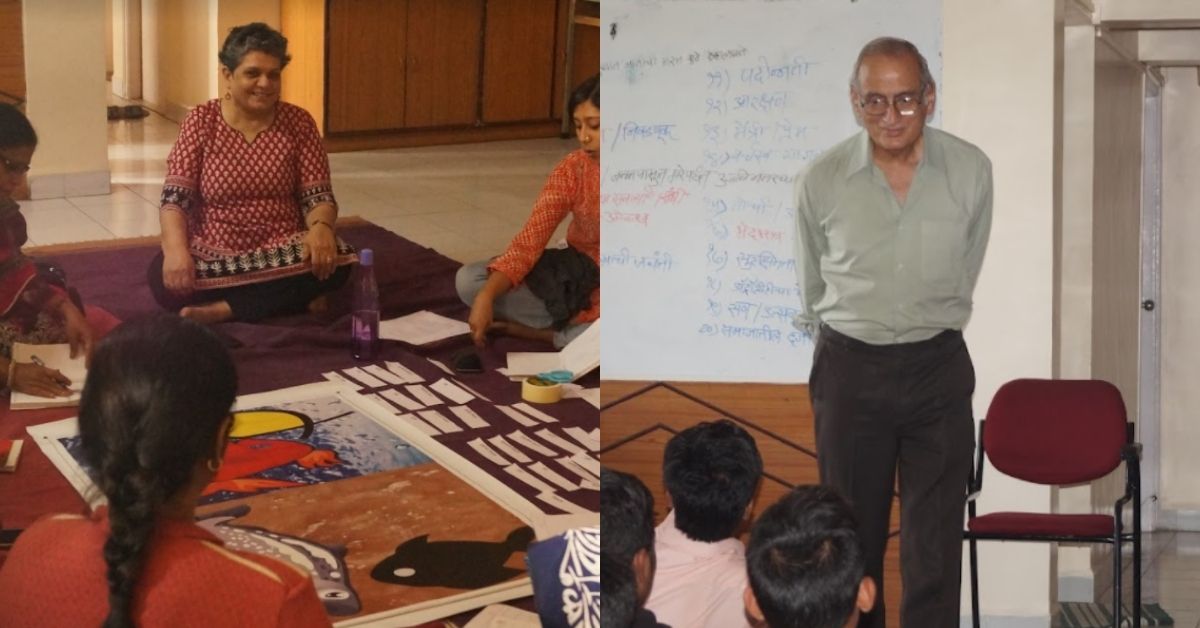
Over time, MASUM has helped around 10,000 women from vulnerable communities, such as Dalit women, gain access to adequate sexual healthcare, in turn helping strengthen their sexual and reproductive rights.
Seeing the ‘real’ India
The inception of the organisation was in 1987 when the duo moved to Malshiras with their baby in tow. It was a bold move, to say the least, but one that had been years in the making.
Dr Gupte and Dr Awasthi met as part of the Chhatra Yuva Sangharsh Vahini during the Jayaprakash Narayan (JP) Movement (Total Revolution movement) in the 70s. Soon, former Prime Minister Indira Gandhi would declare the Emergency, during which the duo took up several tasks in the subsequent anti-Emergency movement.
Dr Gupte (65) comes from a long line of social activists and trade unionists, so her transition to civil rights and the socio-democratic movement was almost seamless, she says. After completing her MSc in microbiology, she pursued her PhD in sociology, where she extensively studied the concept of patriarchal and caste honour.
Meanwhile, Dr Awasthi, now 71, says, “I have done my BTech and MTech in chemical engineering from IIT Delhi. I was very active in the anti-Emergency movement in Delhi. During the JP Movement, those of us at IIT formed a group to consider alternatives in different areas, including education, health and economic policies, and so on. When the Janata government came, a new health policy was put in place. As part of the Chhatra Yuva Sangharsh Vahini, I wanted to understand this policy, for which we organised a joint seminar with the Indian Medical Association in Mumbai.”
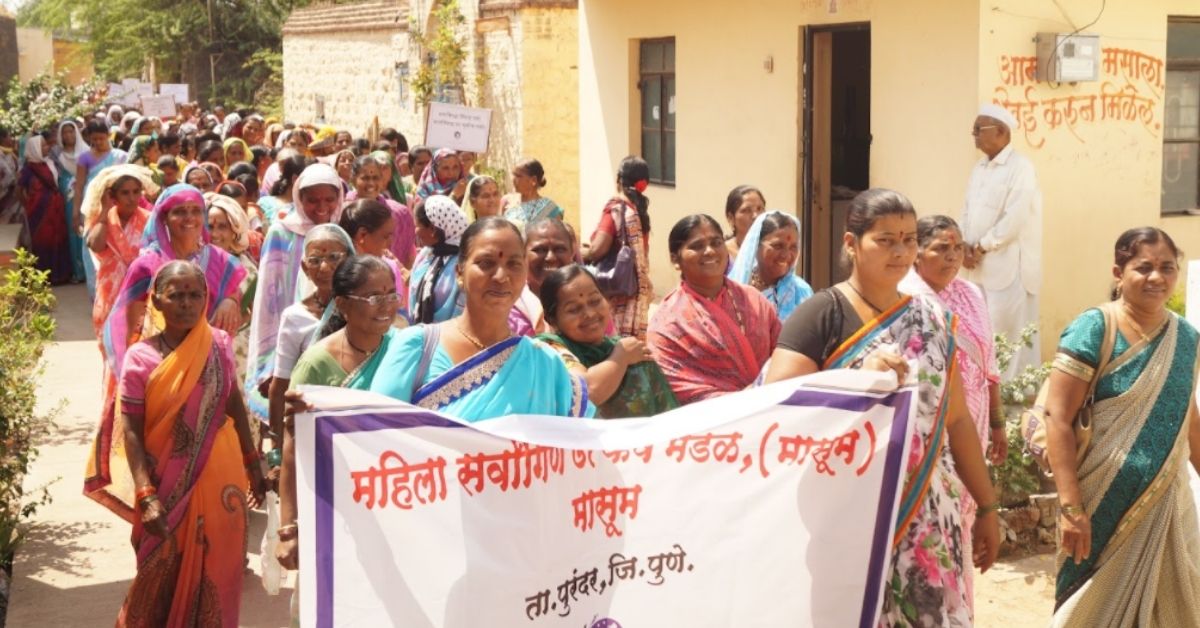
At the conference, Dr Awasthi met Dr NH Antia, a renowned plastic surgeon and social worker who pioneered the treatment and rehabilitation of patients with leprosy. He and Dr Gupte worked with Dr Antia’s The Mandwa Project, which was set up to explore the possibilities of using an alternative strategy for providing health services. After Dr Awasthi completed his PhD, he and Dr Gupte joined the Foundation for Research in Community Health, where they worked for two years.
“When Manisha and I had enough money, we told Dr Antia that we wanted to go and work in villages,” Dr Awasthi explains. “That was the dream we saw during the Total Revolution movement. When I had met JP, he had said, ‘To see the real India, young people should work in villages.’ So that’s what we wanted to do. We developed a health education project that we got sanctioned from the Indian Council of Medical Research. With this, we landed in Malshiras village.”
Malshiras is a remote village located around 150 km from Pune and lacks even basic roads and other such facilities. Regardless, it soon became their home, where they went through many learning journeys and found acceptance with the villagers. “We participated in the people’s happiness, their sorrow, grief, and loss. They embraced us and our daughter, with open arms. These people couldn’t even put together two square meals, but they would share their food with our children. The community completely engulfed us with their love,” Dr Gupte says.
They initiated a programme to counter violence against women to provide legal and emotional support to victims of violence, abuse and exploitation.
Inclusive healthcare for all
“While working at Malshiras, we found that the biggest reason for debt is healthcare expenditure,” Dr Gupte explains. “There was also a need to strengthen public health services. We also found alarming statistics. For example, after conducting a haemoglobin testing drive, we found that most women had less than 8%. That would ideally need hospitalisation, but the women couldn’t afford it, and would sometimes just wake up one day and die.”
Under MASUM’s sexual and emotional health programme, the idea is to restore this agency to women. Kajal Jain, who runs MASUM’s health programme, explains, “It’s very difficult for women to bring up reproductive health in front of their family or even doctors. They don’t know how to frame their words. Unless and until they get so sick that their work stops altogether, they won’t approach a doctor. So in many cases, it is too late to seek help.”
MASUM is the district nodal agency for Community Based Monitoring of public health services under the National Rural Health Mission Programme. They focus on early diagnosis of illnesses, wherein their village health workers encourage self-examination to help women understand their bodies and participate in examination and treatment. They are taught to conduct full-body, speculum and bimanual examinations. The NGO provides services to detect reproductive tract infections, cervical cancer, uterine prolapse and other gynaecological problems. Alongside, they provide traditional herbal remedies, allopathic drugs, teach ergonomic exercises, and more.
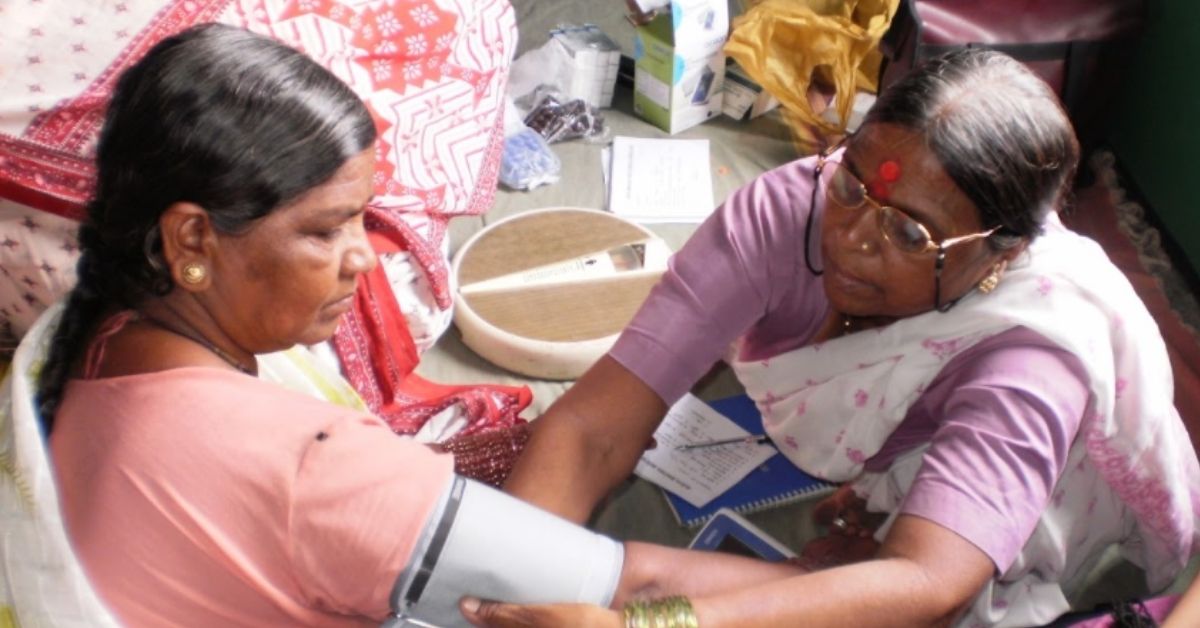
Kajal says that the organisation selects and trains women from marginalised communities in conducting health examinations. “We do comprehensive screenings for cervical cancer. This is arguably one of the few cancers that can be treated well if it is detected early, but due to so many gaps in healthcare infrastructure, it often isn’t,” she notes.
Women are also encouraged to understand and get comfortable with their bodies. “We conduct a programme wherein we invite women to stand before a mirror and inspect their vaginas, understand the types of discharge — like what is healthy and what is not — and identify problem areas if any. We tell them to understand various types of smells, like what could indicate a fungal infection, trichomoniasis, and so on. Sometimes, if they’re comfortable, they will call in their friends and conduct examinations.”
Ranjana, a 48-year-old resident of taluka in Pune, says, “I’ve watched MASUM work in our area for the last 30 years or so. What makes me happiest to see is that over time, our knowledge about how we can access healthcare, as well as of our bodies, has increased multifold.”
“We learnt about many things, like how to take care of ourselves when we’re menstruating, how to take note of what kind of discharge we have, childbirth, how to detect severe illnesses, and more. Moreover, our expenses on healthcare have been reduced by a huge margin. We were barely able to save earlier, but now, we can save up to Rs 20,000 on healthcare expenditure,” she adds. “We feel better connected to ourselves.”
With this, women from across 20 villages around Pune and Ahmednagar have benefited from these programmes.
‘The knowledge lies with the people’
Meanwhile, Dr Gupte and Dr Awasthi are looking to retire from their executive duties in a few years, and currently reside in Pune. Regardless, MASUM has been an immense learning curve for both, and the biggest lesson has been to listen in silence, Dr Gupte says.
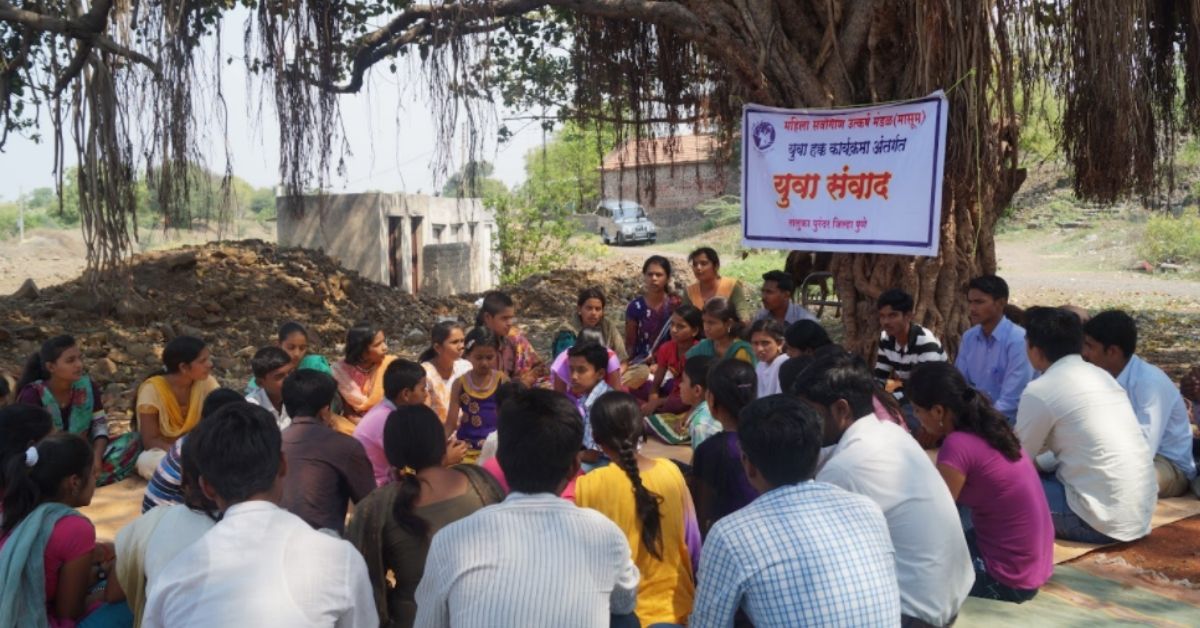
“We have found that there is this huge gap between how city dwellers view rural areas and how life actually is here,” she explains. “Those of us in urban areas can have good intentions and big hearts, but it does not mean that our ideas will always work for everyone else. We have to remember that those who are silenced in this power pyramid usually have the best observations and strategies to change the system. The knowledge lies with the people.”
At MASUM, there is also a focus on decentralising power — to involve the people you are working for in the cause, to encourage direct participation rather than offer instructions on what is to be done. “When in doubt, ask,” Dr Gupe emphasises. “Whatever you think you can do well on your own, can be done better collectively.”
With inclusivity being at the heart of everything that MASUM does, there is a greater need to take cognisance of growing disparities in India. Dr Awasthi says, “At the societal level, being self-obsessed in terms of salary, career and acquisitions on one end, and getting caught in the growing divisive, hate-filled and narrow-minded identity politics at the other end are alarming trends. Unemployment, hopelessness, and growing disparities encourage toxic masculinity, violence, misogyny and attacks on vulnerable groups.”
In a talk that she gave at a seminar conducted by the American Jewish World Service, Dr Gupte summarised MASUM’s work in a simple line — “I don’t think women need protection, but women’s rights need protection.”
For more information or to donate, you can visit MASUM’s website.
(Edited by Yoshita Rao)

Similar Story
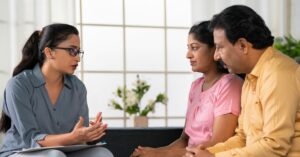
Would Your Parents Support You Taking Therapy? This Mental Wellbeing Survey Reveals an Unseen Change
An ITC Fiama survey on mental health shows 80% of Indians trust their parents to back them in seeking therapy, signalling a change in how its perceived by Gen Z, millennials, and their parents.
Read more >
If you found our stories insightful, informative, or even just enjoyable, we invite you to consider making a voluntary payment to support the work we do at The Better India. Your contribution helps us continue producing quality content that educates, inspires, and drives positive change.
Choose one of the payment options below for your contribution-
By paying for the stories you value, you directly contribute to sustaining our efforts focused on making a difference in the world. Together, let's ensure that impactful stories continue to be told and shared, enriching lives and communities alike.
Thank you for your support. Here are some frequently asked questions you might find helpful to know why you are contributing?


This story made me
-
97
-
121
-
89
-
167












